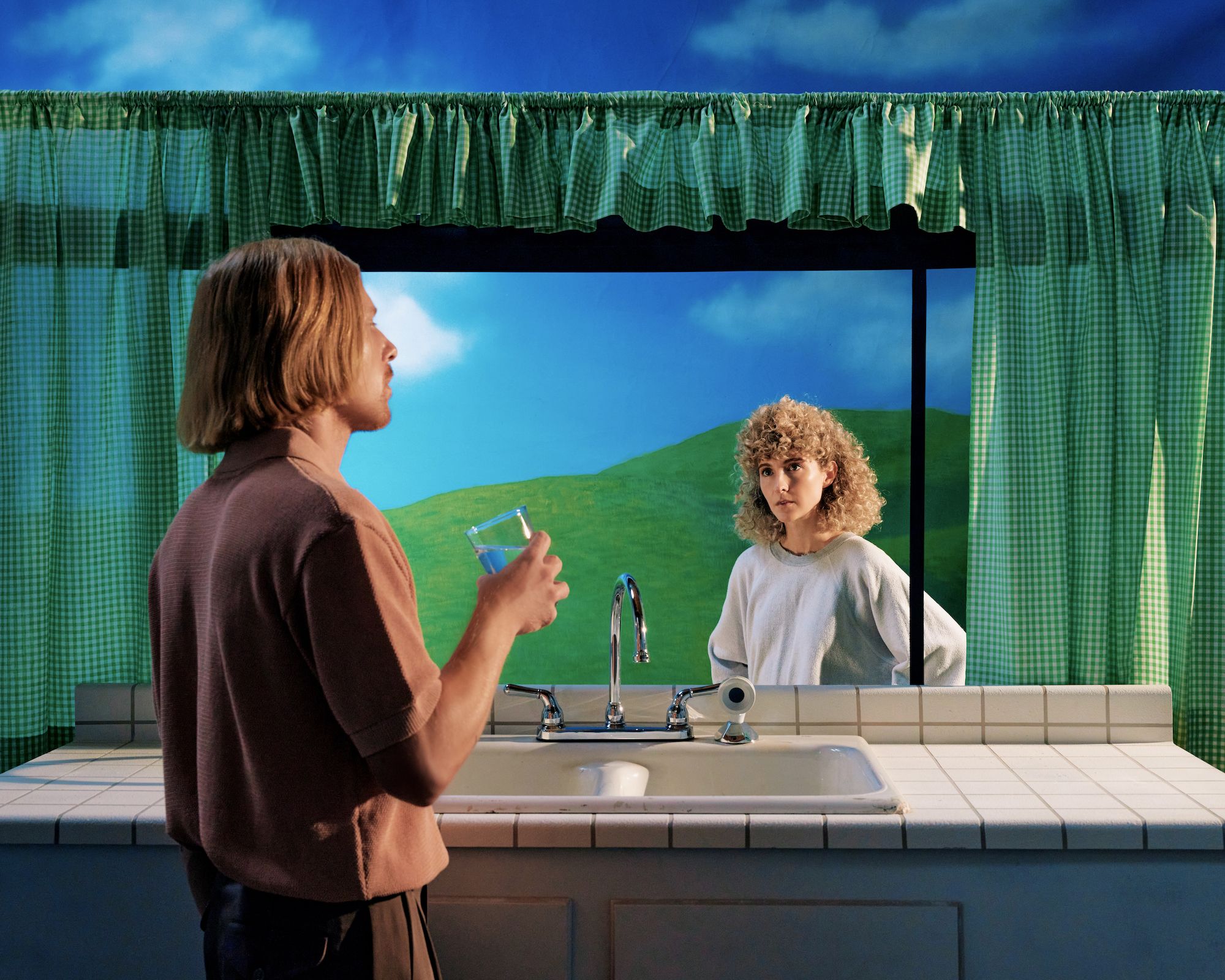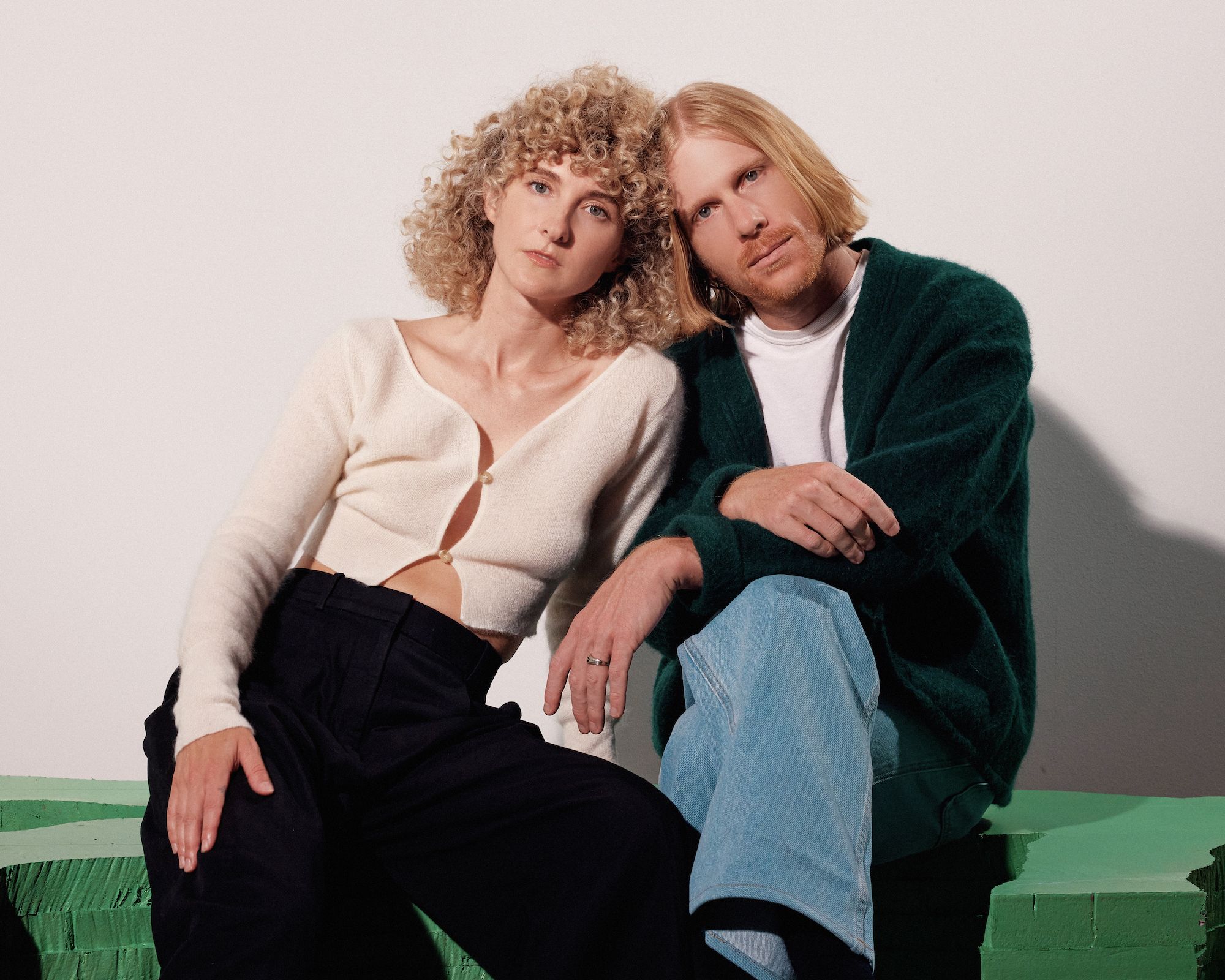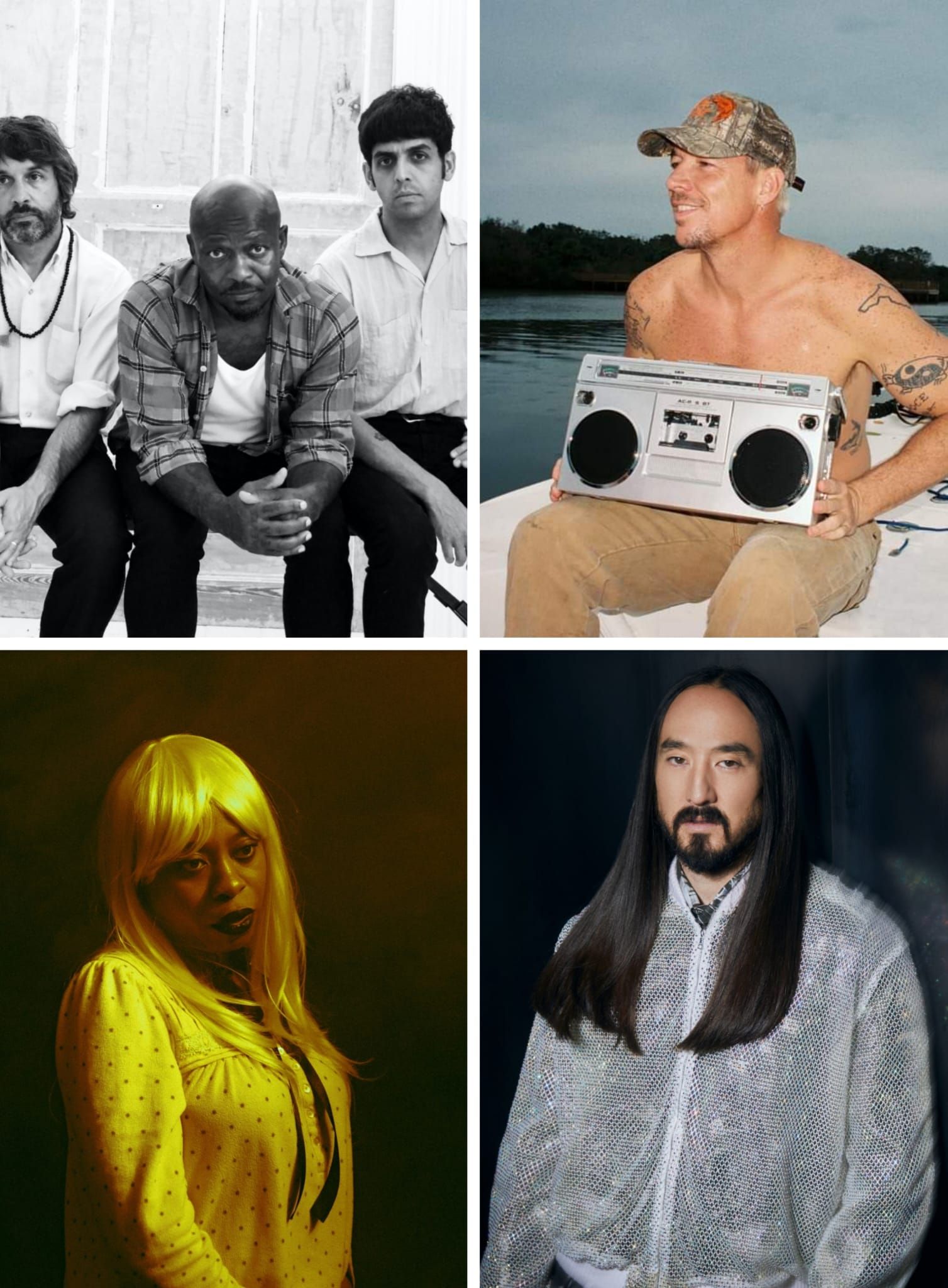
Tennis
Tennis has returned with yet another mesmerizing, refreshing and blossoming record, Pollen.
The love child of Tennis’s fruitful journey as a duo for the past decade and more, Pollen is theatrical at times and devoted all throughout. A sonic palette with an abundance of disco influence, as well as tender songwriting reminiscent of Brill Building girl groups and legendary masterminds like Carole King, Pollen feels even more courageous and confident in comparison to the rest of Tennis’s expansive, intricately beautiful discography.
As per usual, Pollen is thematically cohesive, this time centering around the love and caring the duo hold for each other. With passion as the key to it all, Pollen ventures from the airy, tempting “Forbidden Doors,” to the synth-leading “Let’s Make A Mistake Tonight” and the rhythmic jams like “Never Been Wrong.” While never letting go the feeling of ease, the pair faced past challenges with vulnerable writing and an array of experimental instrumentations. Encouraging listeners to look inward, Pollen proposes a symbolic dichotomy between beauty and danger, as the band once again hones in on their strength to portray both motions and emotions.
At the dawn of Pollen and the upcoming national tour, 1883 caught up with Alaina Moore and Pat Riley to discuss their newest masterpiece:
I’ve been starting every interview this year with a very simple introduction question, what is one song you’re currently obsessed with?
Alaina: Yeah. Although I’m not sure which one, but we just got the Minnie Riperton album, Come To My Garden, on vinyl. Well, I know “Les Fleurs” is really good, but I don’t know, it’s the second one called “Completeness” that I’m obsessed with. We just got this on vinyl.
A lot of the album’s the second track is so important. I definitely thought “Glorietta” is such a strong track.
Alaina: I actually love that you’ve pointed that out. We are very attached to that song, placed it there intentionally and debated a lot about it being a single, but I think it’s just not quite [a single]. We don’t really write singles in the conventional sense outside of “Let’s Make a Mistake Tonight.” From then on, it was more about what songs do we want to highlight across the record. I wish we could have picked one more song, “Glorietta” would have been one of them.
Pat: We were actually, for a while, toying with that being the opening track to the record.
I want to talk about “Forbidden Door” too because it feels like a metaphor for something. And there are definitely particular motifs that I will discuss later…
Alaina: What’s the motif that you felt like? Or a theme that you were noticing in that one? Because you’re right, there’s a lot of significance to that song.
Let me try to just use a few descriptors. It’s just feel very euphoric. It’s definitely signifying some kind of beginning. This feels hopeful, but at the same time, in a very gentle and not rushing way.
Alaina: Yeah, no, that’s so sweet. We often write music first, and I have lots of lyrics that I will be working on, generally, but they’re not really aimed at anything specific. I just journal and write a lot of fragments of poetry. But this song, it felt like the beginning of something and the leaving of something behind, or when you start a new chapter journey in your life. It’s sort of a common theme in our relationship, we’re always on the highway, aimed towards another city, but in the rearview mirror is another city. It’s always this trading of something, an opportunity, a world or relationship, a community and experience. So it is like a thrill, but there’s always bitter sweetness, because you’re always leaving something behind. That’s what I was imagining when we wrote this song.
Pat: For us, our whole lives are this feeling repeated over and over again, every album cycle, whether it be you changed record labels, or you are recording at a new studio with new people. You’re starting over again, every single time, Alaina and I have grown accustomed to this feeling of starting over and having to look at the world with fresh eyes.
Alaina: Yeah, because saying yes to a new thing means releasing what you had before.
I will look at that song differently now, that is a very beautiful message and one that many artists can relate to. One thing that makes Tennis stand out is that almost every album is a concept album. You guys build a world around it with visuals and motifs and messages, as well as overarching storylines. What is the world of Pollen in your words?
Alaina: Pollen has a lot of meaning on a larger and a smaller, more personal level. If you are close to me or anyone in my family, you’ll know that we all have terrible allergies.
Pat: It’s the only reason we cancel shows.
Alaina: We joke about how it’s this tiny little molecule that can just destroy everything. So for us, it was thinking about the power contained in a very small thing and the fragility that you have in relation to that. It doesn’t need to literally mean pollen as it does for me, and the song on the album, “Pollen Song,” is literally about pollen fucking me up. But it can be about relationships, just that vulnerability, the way it can spin you out into nothing.
Pat: Or even that something beautiful can also harm you.
Alaina: Yeah, the sense of change. Pollen is connected to the changing of seasons, so one sentiment I tried to express in the song, “Pollen Song,” is about how it’s really difficult for me to just be in the moment of natural beauty, and accept and appreciate, be present in that, because you’re very wrapped up in the sense that it will all fade away. There’s a lot of things about understanding seasons of life and knowing that no matter how good something is, it will go away eventually, which I guess connects back to “Forbidden Doors” about always leaving something behind to move to the next thing. So it’s a very sprawling metaphor. It’s not that succinct, but how it meant so much on a zoomed out sense and on a really personal individual sense.

I like the idea of a sprawling metaphor, because much of this album feels that way. A lot less is being contained, and a lot of different ideas are being explored with different songs. Even from the first two music videos. I think we didn’t expect the second video to look that way, given the first video existed. In comparison, Swimmer has a more contained visual world and visual language to it. So what makes this run of album more sporadic and expansive?
Alaina: Absolutely. It’s a great question. It’s something we thought about a lot. This album feels thematically unified, but it feels almost like a mixed tape from different genres. “It’s all still Tennis and our point of view, but if you compare, “Glorietta” to “One Night with The Valet,” those songs are very different and that was intentional. We wanted to explore all the music that has influenced us. And in fact, there’s so much more that didn’t even get a chance to be expressed on this record. So I think that’s part of why the visuals feel very distinct. We want this visual to belong to that song. We imagined the album as a playlist or a mixtape.
Then I was gonna bring up “One Night with The Valet,” because it’s such a strong track. The idea of “valet” also comes up again with “Hotel Valet,” which is another one of my personal favourite. I was surprised when I watched a music video–it has nothing to do with valet. What does the whole concept of “valet” play into the whole album?
Pat: Oh, that’s me. So when Alaina and I met, I was working graveyard at a hotel as a valet for a very long time. And Alaina was a waitress at a place that I used to get breakfast at. So that’s actually the first time we saw each other, but we didn’t meet each other until later in college.
Alaina: He was wearing the uniform of his valet job at the hotel. So yeah, both songs are about Pat and I wrote the lyrics to both all in one journal entry, and then we split them up into two songs.
Would you say that the idea of love is the overarching idea for this album?
Alaina: It’s more than love, it’s more about Pat specifically. I keep thinking that I will be done writing songs about him and our relationship, but I’m never out of ideas to write about. Frankly, it’s more than just love, all the love is part of it. It’s a companionship, a partnership, a creative, collaborative relationship. It permeates so many levels of my life experience that it’s just an ever filling well of ideas to write about.
Pat: I mean, at this point, we’ve lived together for 14 years, so we have shared pretty much every mutation of life. And we’ve seen each other and our lowest lows and our highest highs–obviously, the first time we ever saw each other, I was a valet, and she was a waitress. We’ve just lived a lot of life together at this point.
Alaina: Yeah, now that we’re later in our career, deeper into our album making process, it was very rewarding for me to reflect on the first few months of knowing him and just remembering what that felt like.
That is so sweet. Kind of related to the topic of companionship, I know that we try a bunch of different instruments that were new to the both of you this time around. Tell me a little bit more about what’s it like to include some different elements to this particular part of your discography? And one particular moment that’s very memorable in the album making process?
Pat: Every album we try and shape the sonic palette. For this record, we picked all the keyboards that we thought would give it the flavor that we wanted, all the microphones we wanted to use and the drums, then what location and what type of sound we wanted. As far as it feeling foreign to us, or it doesn’t, because it almost is like you’re leaning farther into getting the album to the finish line.
Alaina: We’ve noticed that the way we write in the studio, the instrument we use, the sound of it influences the part you write. Even though I still played mostly keys on this record, it’s more exciting for us to work with new keyboards that I’ve never used before that have different sounds. Otherwise you fall into a rut, you start to have your own style of playing and it gets very ingrained. We’ve noticed that changing the instruments out opens things up to keep it fresh.
You have to unlearn it a little bit, you have to let yourself just think, does it sound good? It doesn’t matter if it’s following any rules at all. In fact, most of the best music or any breakthrough in music comes from breaking a rule. And obviously, it’s better to break a rule after you know the rules. We have some understanding, fortunately, we grew up playing instruments our whole lives, but we were also music school dropouts who were really bad students. Even though we write pop adjacent music, there’s a lot of rules being broken, because we didn’t know what the rules were, we just do what sounds good.
This leads to my next question. Tennis never feels like an indie pop band to me, but that tends to be the big umbrella term that you guys fall under. I pick up a lot of different rock elements from different eras. What would you say?
Alaina: As far as artists, it’s not so much genres that we prefer, it’s more like artists from each genre. And we’d like something from every era and sub culture of music, whether it’s disco, or psych folk, prog rock, hip hop or straight up pop music, or like, singer/songwriter like Brill Building girl groups.
Pat: I still think at the end of the day, we’re most influenced by the 60s, especially girl groups that were recorded by like some of those wonky producers/engineers like Joe Meek and Phil Spector, mainly because hat was the first time Alaina and I both felt that magic of music. It was like you’re listening to something that’s utterly simple, but you’re having a response to it that’s ineffable. Still to this day, even if we’re doing a track that’s more 80s leaning, we go to it with the perspective of a 60s producer, even the way we track the drums or the way we track the vocals were using more formulas that those people used in the 60s.
Alaina: It’s a little bit later, like early 70s, the songwriters who were trained and influenced by the 60s girl group era, but started moving more towards the 70s sound, like Carole King, standing on top of the history of girl groups, but shifting past it into bit more in depth songwriting.
What is a personal favourite musical moment in this album?
Alaina: I really like Pat’s guitar solo on “Forbidden Doors.” That feels like a big moment. I’m kinda reminds me of The Who, or Yes, a little bit.
Pat: My favourite musical moment is either “Pillow for a Cloud–” just that whole song, that’s my favourite song on the record. I love it for so many reasons, but also the chorus to “Pollen Song.”
Alaina: And then the Latin section in “Never Been Wrong.”
Perfect. Because I was like, I’m gonna bring up this song because I really like it. There is this interview that you two did for the last album run. I remember you guys saying that “Need Your Love” is sonically the direction that you guys are proud of in that moment, and something fans can look forward to in the next album–which we are at the next album now. So I seek to find that one song on this album that reminds me of “Need Your Love,” and that song for me was “Never Been Wrong.” Do you agree with that?
Alaina: It’s got some very choppy, aggressive changes like “Need Your Love.”
Pat: Also the time signatures. I have a friend who is a conductor, and I showed him the time signature, because it’s not only 6/8, it’s also 4/4, and you can interpret it in either way. We never had this before and it was by accident. We didn’t know we were doing that but it just happened.
Alaina: Well, it makes sense. Because 6/8 is my favourite time signature. I was trying to write a song that’s 4/4, but my internal rhythm is 6/8.
I’m gonna geek out over it. I learned piano as a kid. For you to have a time signature in mind when you’re writing is a very piano player instinct.
Alaina: Uh huh. I think actually, what we tapped into with “Need Your Love” would be the song “Paper.” The groove and everything feels very different, but the the piano playing is very reminiscent of “Need Your Love.”
I know that you guys are going to be back on the road again for this album as well. Are you excited for it? What’s something that you’re looking forward to for touring?
Pat: I feel like the last tour was the first tour where we felt like we were having a lot of fun. Normally, it can be really hard for us, just learning the songs and having them translate in a venue. We’ve now been playing with our band for about five years now, and we are all comfortable playing with each other. We’re just at the good part of touring now. We have a good band. We feel good on stage. Everything’s great. And we’re just excited to get out there.
Pollen is out now.
Interview Gomi Zhou



